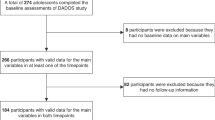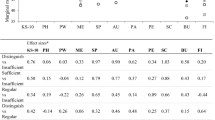Abstract
The world’s largest school-based mental health program, Habilidades para la Vida [Skills for Life (SFL)], has been operating on a national scale in Chile for 15 years. SFL’s activities include using standardized measures to screen elementary school students and providing preventive workshops to students at risk for mental health problems. This paper used SFL’s data on 37,397 students who were in first grade in 2009 and third grade in 2011 to ascertain whether first grade mental health predicted subsequent academic achievement and whether remission of mental health problems predicted improved academic outcomes. Results showed that mental health was a significant predictor of future academic performance and that, overall, students whose mental health improved between first and third grade made better academic progress than students whose mental health did not improve or worsened. Our findings suggest that school-based mental health programs like SFL may help improve students’ academic outcomes.
Similar content being viewed by others
Notes
Covariates were first grade variables of percent attendance, gender, family participation in welfare, school identification number, whether the mother was a teenager when the child was born, whether the father was living with the child, whether the child had a chronic illness leading to one or more school absences a month, whether the child was living with a relative disabled by mental illness, and whether the family participated in organized social activities These covariates were included in all of the other analyses reported below.
References
Burnett-Zeigler I, Walton MA, Ilgen M et al (2012) Prevalence and correlates of mental health problems and treatment among adolescents seen in primary care. J Adolesc Health 50:559–564
Chau K, Baumann M, Kabuth B, Chau N (2012) School difficulties in immigrant adolescent students and roles of socioeconomic factors, unhealthy behaviours, and physical and mental health. BMC Public Health 12:453
Fernandez-Castillo A, Gutierrez-Rojas ME (2009) Selective attention, anxiety, depressive symptomatology and academic performance in adolescents. Electron J Res Educ Psychol 7:49–76
Fleming CB, Harachi TW, Cortes RC, Abbott RD, Catalano RF (2004) Level and change in reading scores and attention problems during elementary school as predictors of problem behavior in middle school. J Emot Behav Disord 12:130–144
Meltzer LJ, Levine MD, Karniski W, Palfrey JS, Clarke S (1984) An analysis of the learning styles of adolescent delinquents. J Learn Disabil 17:600–608
Morgan PL, Farkas G, Wu Q (2012) Do poor readers feel angry, sad, and unpopular? Sci Stud Read 16:360–381
Murphy JM, Jellinek MS, Milinsky S (1989) The Pediatric Symptom Checklist: validation in the real world of middle school. J Pediatr Psychol 14:629–639
Trout AL, Nordness PD, Pierce CD, Epstein MH (2003) Research on the academic status of children with emotional and behavioral disorders: a review of the literature from 1961 to 2000. J Emot Behav Disord 11:198–210
Kessler RC, Foster CL, Saunders WB, Stang PE (1995) Social consequences of psychiatric disorders, I: educational attainment. Am J Psychiatry 152:1026–1032
Graziano PA, Reavis RD, Keane SP, Calkins SD (2007) The role of emotion regulation in children’s early academic success. J Sch Psychol 45:3–19
Breslau J, Lane M, Sampson N, Kessler RC (2008) Mental disorders and subsequent educational attainment in a US national sample. J Psychiatr Res 42:708–716
Delaney L, Smith JP (2012) Childhood health: trends and consequences over the life course. Future Child 22:43–63
Berhenke A, Miller AL, Brown E, Seifer R, Dickstein S (2011) Observed emotional and behavioral indicators of motivation predict school readiness in Head Start graduates. Early Child Res Q 26:430–441
Chenier JS (2012) Using behavioral screening data to predict scores on statewide assessments [dissertation]. Louisiana State University and Agricultural and Mechanical College, Baton Rouge
Cobb JA (1972) Relationship of discrete classroom behaviors to fourth-grade academic achievement. J Educ Psychol 63:74–89
Guzman MP, Jellinek MS, George M et al (2011) Mental health matters in elementary school: first-grade screening predicts fourth grade achievement test scores. Eur Child Adolesc Psychiatry 20:401–411
Kantomaa MT, Tammelin TH, Demakakos P, Ebeling HE, Taanila AM (2010) Physical activity, emotional and behavioural problems, maternal education and self-reported educational performance of adolescents. Health Educ Res 25:368–379
Lambert NM, Nicoll RC (1977) Conceptual model for nonintellectual behavior and its relationship to early reading achievement. J Educ Psychol 69:481–490
Rothon C, Head J, Clark C, Klineberg E, Cattell V, Stansfeld S (2009) The impact of psychological distress on the educational achievement of adolescents at the end of compulsory education. Soc Psychiatry Psychiatr Epidemiol 44:421–427
Biederman J, Petty CR, Evans M, Small J, Faraone SV (2010) How persistent is ADHD? A controlled 10-year follow-up study of boys with ADHD. Psychiatry Res 177:299–304
Pingault J, Tremblay RE, Vitaro F et al (2011) Childhood trajectories of inattention and hyperactivity and prediction of educational attainment in early adulthood: a 16-year longitudinal population-based study. Am J Psychiatry 168:1164–1170
Jellinek M, Bishop Josef S, Murphy JM, Zigler EF (2005) Mental health in Head Start: leave no child behind. NHSA Dialog 8:25–35
George M, Guzmán J, Flotts M, Squicciarini AM, Guzmán MP (2012) Salud mental en escuelas vulnerables: evaluación del componente promocional de un programa nacional [Mental health in vulnerable schools: evaluation of the promotional component of a national program]. Revista de Psicología 21:55–81
Werthamer-Larsson L, Kellam S, Wheeler L (1991) Effect of first-grade classroom environment on shy behavior, aggressive behavior, and concentration problem. Am J Community Psychol 19:585–602
George M, Siraqyan X, Mores R et al (1994) Adaptación y validación de dos instrumentos de pesquisa de problemas de salud mental en escolares de 1° básico [Adaptation and validation of two screening instruments for mental health problems in primary school]. Revista de Psicología 5:17–26
George M, Squicciarini AM, Zapata R, Guzmán MP, Hartley M, Silva C (2004) Detección precoz de factores de riesgo de salud mental en escolares [detection of early mental health risk factors in primary schools]. Revista de Psicología 13:9–20
Department of Student Health—JUNAEB, George M, Guzmán J, Guzmán MP, Hartley M, Squicciarini AM (2008) Manual de apoyo técnico-metodológico [Technical/methodological support manual]. Government of Chile, Santiago, Chile
Jellinek MS, Murphy JM, Burns BJ (1986) Brief psychosocial screening in outpatient pediatric practice. J Pediatr 109:371–378
Kelleher K, McInerny TK, Gardner WP, Childs GE, Wasserman RC (2000) Increasing identification of psychosocial problems: 1979–1996. Pediatrics 105:1313–1321
Massachusetts General Hospital (2013) National Quality Forum endorses Pediatric Symptom Checklist. http://www.massgeneral.org/psychiatry/about/newsarticle.aspx?id=4119. Accessed 24 June 2013
National Quality Forum (2013) What we do. Available at: http://www.qualityforum.org/what_we_do.aspx. Accessed 28 June 2013
Jellinek MS, Murphy JM (2012) About the PSC. Available at: http://www.massgeneral.org/psychiatry/services/psc_about.aspx. Accessed 5 Nov 2013
Murphy JM, Jellinek M (1988) Screening for psychosocial dysfunction in economically disadvantaged and minority group children: further validation of the Pediatric Symptom Checklist. Am J Orthopsychiatry 58:450–456
Murphy JM, Ichinose C, Hicks RC et al (1996) Utility of the Pediatric Symptom Checklist as a psychosocial screen to meet the federal Early and Periodic Screening, Diagnosis, and Treatment (EPSDT) standards: a pilot study. J Pediatr 129:864–869
Jellinek MS, Murphy JM, Robinson J, Feins A, Lamb S, Fenton T (1988) The pediatric symptom checklist: screening school-age children for psychosocial dysfunction. J Pediatr 112:201–209
De la Barra F, Toledo V, Rodriguez J (2005) Prediction of behavioral problems in Chilean schoolchildren. Child Psychiatry Hum Dev 35:227–243
Paredes RD, Ugarte G, Paulo Volante P, Fuller D (2009) Asistencia, desempeño escolar y política de financiamiento [Attendance, school performance and financing policy]. In: Camino al bicentenario: propuestas para Chile [Approaching the bicentennial: proposals for Chile]. Ministerio Secretaría General de la Presidencia, Santiago, Chile
Lacour M, Tissington LD (2011) The effects of poverty on academic achievement. Educ Res Rev 6:522–527
Rothon C, Goodwin L, Stansfeld S (2012) Family social support, community “social capital” and adolescents’ mental health and educational outcomes: a longitudinal study in England. Soc Psychiatry Psychiatr Epidemiol 47:697–709
Williams RL (2000) A note on robust variance estimation for cluster-correlated data. Biometrics 56:645–646
Author information
Authors and Affiliations
Corresponding author
Rights and permissions
About this article
Cite this article
Murphy, J.M., Guzmán, J., McCarthy, A.E. et al. Mental Health Predicts Better Academic Outcomes: A Longitudinal Study of Elementary School Students in Chile. Child Psychiatry Hum Dev 46, 245–256 (2015). https://doi.org/10.1007/s10578-014-0464-4
Published:
Issue Date:
DOI: https://doi.org/10.1007/s10578-014-0464-4




